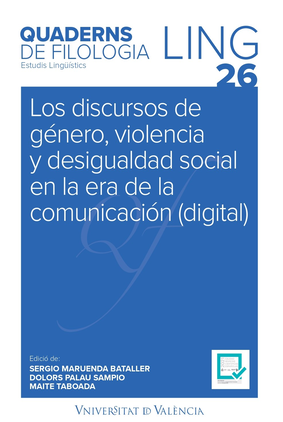La desigualtat de gènere en Twitter durant les eleccions britàniques de 2019
DOI:
https://doi.org/10.7203/qf.0.21982Paraules clau:
corpus, anàlisis del sentiment, discurs de l’odi, dones, Twitter. Resum
Resum
Actualment, les plataformes de xarxes socials com Twitter tenen un paper essencial en la política i els moviments socials. L’objectiu d’aquest article és comparar i contrastar el llenguatge utilitzat a Twitter per referir-se als candidats de les darreres eleccions generals del Regne Unit de desembre de 2019 per tal de crear consciència sobre la desigualtat de gènere a la política. La metodologia seguida es basa en tres aspectes: (a) un anàlisi quantitatiu mitjançant Sketch Engine per extreure les principals colocacions del corpus; (b) un anàlisi del sentiment dels tuits compilats mitjançant dues classificacions de lèxic: BING (Hu i Liu, 2004) i NRC (Mohammad i Turney, 2013), que classifica les paraules en vuit emocions bàsiques i dos sentiments (positiu i negatiu) ); i (c) un anàlisi qualitatiu que utilitza un enfocament d’Anàlisi Crític del Discurs (Fairclough, 2013) per examinar l’abús verbal envers les dones des d’una perspectiva lingüística.
 Descàrregues
Descàrregues
Descàrregues
Publicades
Com citar
-
Resum1435
-
PDF (Español)876
Número
Secció
Llicència
 Este obra está bajo una licencia de Creative Commons Reconocimiento-NoComercial-SinObraDerivada 4.0 Internacional.
Este obra está bajo una licencia de Creative Commons Reconocimiento-NoComercial-SinObraDerivada 4.0 Internacional.
Tots els documents inclosos a OJS són d'accés lliure i propietat dels seus autors i/o institucions editores, i per tant, qualsevol acte de reproducció, comercialització, comunicació pública o transformació total o parcial necessita el consentiment exprés i escrit d'aquests.
Authors who publish with this journal agree to the following terms:
- Authors retain copyright and grant the journal right of first publication with the work simultaneously licensed under a Creative Commons Attribution License that allows others to share the work with an acknowledgement of the work's authorship and initial publication in this journal.
- Authors are able to enter into separate, additional contractual arrangements for the non-exclusive distribution of the journal's published version of the work (e.g., post it to an institutional repository or publish it in a book), with an acknowledgement of its initial publication in this journal.
- Authors are permitted and encouraged to post their work online (e.g., in institutional repositories or on their website) prior to and during the submission process, as it can lead to productive exchanges, as well as earlier and greater citation of published work (See The Effect of Open Access).




